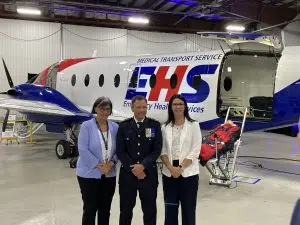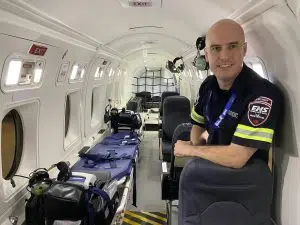Going to Halifax from Yarmouth or Sydney for medical treatment just got a lot faster.
Nova Scotia unveiled its latest addition to the Emergency Health Services LifeFlight fleet today, a new plane that will take non-critical care patients from each tip of the province to the HRM in under an hour. The Beechcraft 1900 airplane can fit up to six patients and four crew members and can transport them at 518 km/h at 25,000 feet in the air.
“Not only is this going to provide great relief to the patients and their loved ones, it’s going to free up a number of paramedics on the ground to respond to emergencies in their communities,” said Health and Wellness Minister Michelle Thompson.
The plane will start out making three round trips a day, meaning it could be two trips from Sydney and one trip from Yarmouth or all three from one spot. This will free up between 6 and 12 ambulances each day for both communities, improving the overall efficiency of the healthcare system. Thompson also says they’re looking to increase the number of trips the plane can make per day once the crews get more experience with the new service under their belts.

Minister Michelle Thompson (right), EHS LifeFlight senior manager Colin Flynn (middle), and LiFlightOperations executive director Paula Martell (Left) pose in front of the new LifeFlight Piper aircraft (Photo by Joe Thomson).
For paramedics, the plane means they’ll be able to do more treating patients and less driving. Before, when patients had to be taken to Halifax in ambulances, it meant paramedics had to spend sometimes more than 10 hours on the road to complete the trip. That’s ten hours that they’re not spending in their communities helping people.
“The truth of the matter is, when we start our job, we want to be responding to 911 calls, we want to be in the communities that we live in, we want to be helping people in their time of need,” said Daniel Gee, a paramedic who will be working on the new plane.

Daniel Gee is a paramedic who will work on the new plane (Photo by Joe Thomson).
“When we get to work in the morning, and we discover we have to be spending 10 plus hours of our shift just driving, it takes a real toll on our desire to be in the program.”
He said that the plane will help get him back to doing what he’s meant to be doing.
“It means I have a different avenue to help people. It means I have the ability to do my profession in a new and exciting way,” said Gee.
The service is projected to cost $5.9 million dollars per year, and represents one of the many ways the government has been trying to fix healthcare in Nova Scotia.









